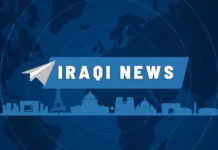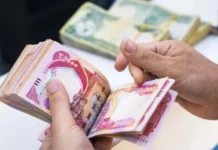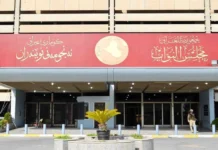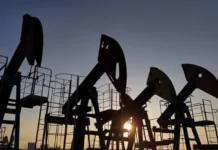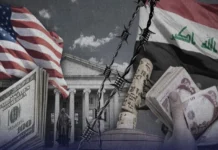Government Advisor: Tensions And War In The Region May Lead To A Jump In Oil Prices
10/14/2024 Mawazine News – Economy The financial advisor to the Prime Minister, Mazhar Muhammad Salih, identified today, Monday, the indicators of the rise in oil prices in global markets, and while he attributed them to two basic variables, he indicated that if tensions and war continue in the region, a jump in prices is expected.
Salih said, according to the official agency: “The oil asset cycle is subject to accelerated upward volatility through current energy market indicators and two basic variables that affect oil supply and demand in the world: the first is OPEC + decisions to reduce oil production on the production of OPEC countries themselves and their allies, as OPEC + has currently implemented large cuts in oil production amounting to 5.86 million barrels per day.”
He added, “These cuts consist of two parts: the first is a reduction of 3.66 million barrels per day extended until the end of 2025, and the other is an additional voluntary reduction of 2.2 million barrels per day that remains in effect until September 2024.”
He pointed out that “the cuts come to remove the current oil glut, which is affected by the decline in growth in the world’s most important energy-consuming economies, China,” noting that “the second variable is the geopolitical situation and the war taking place in the two energy basin regions of the world, namely the Russian-Ukrainian war and the other is the ongoing war in the Middle East, especially the Gaza and Lebanon war with the Zionist entity and its effects on the oil-producing Gulf region, which dominates more than 50% of global oil exports.”
He continued, “If military operations or geopolitical tensions continue in the two regions, oil prices are expected to jump.” https://www.mawazin.net/Details.aspx?jimare=255968
World Bank Support: Is External Financing Enough To Stabilize Iraq?
October 15, 2024 Baghdad/Al-Masala: The World Bank warns that the poorest countries, where about 40% of the population lives below the poverty line, are facing a significant decline in international aid, with an accelerating economic and social deterioration.
The bank’s report indicated that these countries suffer from the highest levels of debt since 2006, which increases the repercussions of climate change, and fuels political instability and wars. These countries have also been severely affected by the Covid-19 pandemic, which led to a 14% decline in per capita GDP between 2020 and 2024.
The World Bank has called for increased external support for these countries through the International Development Association, but bilateral aid has declined significantly, deepening the crisis.
Poor countries must invest 8% of their GDP annually to achieve development goals, a huge challenge given their structural problems and the conflicts that impede control of their territories.
The report indicated that these countries can improve their conditions by increasing tax revenues and improving the effectiveness of public spending, but structural economic conditions and debts constitute a major obstacle.
In the Iraqi case, in terms of the impact of debt and corruption on the country’s economy, Iraq suffers from large debts and a financial system that relies heavily on oil revenues, with low international support and reduced foreign investment.
There are also structural problems such as corruption and political insecurity that hinder necessary economic reforms.
With regional tensions and internal conflicts escalating, Iraq needs massive investments to achieve sustainable development, but without strong international support, Iraq may face a similar path to these poor countries.https://almasalah.com/archives/103288
Government Advisor Prefers Maximizing Non-Oil Revenues By 2024
Information/Baghdad… The Prime Minister’s Economic Advisor, Mazhar Muhammad Salih, preferred, on Tuesday, to maximize non-oil revenues for the year 2024 compared to previous years.
Mazhar said in a statement to Al-Maalouma Agency, “Maximizing non-oil revenues stipulated in the government’s program for financial reform, which calls for raising the contribution of non-oil revenues to 20% of total annual revenues compared to the previous low rates.”
He added, “The development of oil and non-oil revenues (at the semi-annual level) between 2023 and 2024 showed a distinctive growth in revenues in general and non-oil revenues in particular.”
He added, “The main objective of this conservative financial planning is to secure spending priorities in the country’s general budget, most notably government salaries and wages, retirement pensions, social care, and development projects that are a priority in sustainable development.” LINK
Al-Shammari: 757 Billion Dinars In The Ministry Of Interior’s Revenues In 2023
Posted On 2024-10-15 By Sotaliraq Interior Minister Abdul Amir Al-Shammari confirmed that the total revenues for 2023 amounted to 757 billion dinars, which were returned to the state treasury, while he issued strict directives to the Explosives Control Directorate regarding external checkpoints and airports.
The Parliamentary Finance Committee said in a statement: “It hosted, headed by Atwan Al-Atwani, and in the presence of its members and a number of members of other parliamentary committees, the Minister of Interior Abdul Amir Al-Shammari and his accompanying delegation, at the committee’s headquarters to discuss issues related to maximizing revenues and mechanisms for improving the provision of services to citizens.”
Al-Atwani welcomed the Minister of Interior, noting that “the Finance Committee works according to the principle of joint integration to support the government.” He stressed “the need for solidarity in studying the financial and economic situation, and pointed out that relying on oil as a primary resource does not achieve the financial stability required to achieve sustainable development.”
The committee stressed “the importance of forming a committee to study non-oil revenues and monitor their distribution, in addition to analyzing state assets and studying their financial statements. The issue of those whose contracts were terminated and transferring beneficiaries of social protection salaries to the ministry to benefit from their services was also addressed.”
For his part, the Minister of Interior praised the efforts of the Finance Committee and parliamentary committees in supporting the ministry and the government, explaining that “the ministry has received the security file for a number of governorates and is continuing to work on receiving the rest of the governorates, according to the government program.”
He provided an explanation of the ministry’s plan to maximize non-oil revenues, noting that “the total revenues for 2023 amounted to 757 billion dinars, which were returned to the state treasury.”
Discussions between the committee members and the minister touched on many of the ministry’s issues, including the services of issuing electronic passports and unified cards, revenues from the ministry’s fund and other departments, the importance of electronic automation and functional intersection, in addition to discussing the issue of residential complexes.
The committee also inquired about the criteria for distributing job grades according to governorates, stressing “the need for coordination and work to complete the 2025 budget schedules on time.”
In addition, the Minister of Interior, Abdul Amir Al-Shammari, issued directives regarding the Explosives Control Directorate related to external checkpoints and airports.
The ministry said in a statement received by “Al-Zawraa” that “Minister of Interior, Abdul Amir Al-Shammari, visited the Explosives Control Directorate and was briefed on the most important duties and tasks carried out by this directorate.”
According to the statement, the minister stressed “the continuation of training the Explosives Control Directorate’s staff and developing their capabilities,” directing “cooperation with organizations supporting training.” He stressed “the intensification of efforts at external checkpoints and airports, and the rapid response to all calls and work on immediate presence and rapid movement in the event of any emergency, God forbid.”
On the sidelines of this visit, Al-Shammari opened two new buildings in the directorate, and provided support to it by directing the provision of the directorate with juvenile officers and contract police and providing it with various vehicles, including specialized ones, while praising “the work of this directorate and the achievements made by its cadres.” LINK

